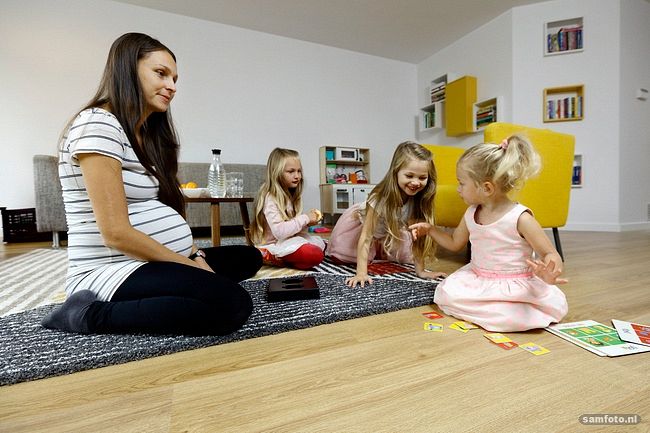When Zuzana van der Werf-Kulichova defended her PhD thesis on October 25 she was 37 weeks pregnant with her fourth child. During her six year tenure as a PhD candidate, she’s had three babies. What’s her secret?
It is fall break, pouring with rain, and Zuzana van der Werf-Kulichova is at home with her three daughters aged five, four and two. The youngest is supposed to be in bed for her nap. Instead, she opens the door of their house in Delft Tanthof smiling. “She doesn’t want to go to sleep when her sisters are around,” Van der Werf laughs. She directs the toddler to the living room in Dutch, though normally she speaks Slovak with them, her mother tongue.
Both older girls are watching a Disney movie in the tidy living room. Fruit and water are on the coffee table. Their younger sister crawls onto the couch to join them, puts the iPad on her lap and just like that, it is possible to have an adult conversation in the presence of three young children.
Van der Werf is currently 36 weeks pregnant, but hasn’t had the time for decorating the nursery or enjoying any maternity leave. In a week she is defending her PhD thesis and she still needs to prepare her presentation.
She laughs when she hears that it was her promotor, Dr. Patricia Osseweijer, who shared her story. “I was 30 weeks pregnant with my first daughter when I started my PhD. At my defence I will be 37 weeks pregnant with my fourth child. Patricia provided me with a great support to finish my thesis while taking the risk that the baby may come right before my defence.”
Van der Werf has been working hard to deliver her thesis, ‘The why’s and how’s of scientists’ policy engagement. The lessons from agricultural biotechnology’, before the birth of her baby. One of her committee members had some substantial comments on her manuscript. During the past three weeks she has worked 14 hours a day to significantly revise her thesis, create the book layout and deliver the final document to the printer on time. “But what I found the most difficult was to keep saying to my girls that they needed to wait another evening before I could read them a bedtime story again,” says Van der Werf.
Imperfections
Not all of her years as a PhD candidate were this stressful. She lists the support of her husband and his parents as a big part of the reason she has been successful. Apart from that, what’s her advice? “Don’t be afraid of imperfections, dare to take a position and just take it step by step.”
Having children forced Van der Werf to work efficiently. “All the work needed to happen when I was in the office, so it did. Also, having babies provided me with natural deadlines I wanted to meet. Like now, every pregnancy I kept on working right until the end, so I had more time with the baby when they were born.”
In total, Van der Werf has taken twelve months of maternity leave and worked 32 hours a week during her five year PhD contract. The months that she spent on maternity leave were not only good for her family, but also for her PhD. “When I started working after being away for sixteen weeks I had a totally fresh perspective. PhDs are usually very focussed on their projects, including weekends and evenings. I found that being able to detach from research created opportunities for gaining new perspectives.”
All her children were wanted, Van der Werf stressed. “I know that many people think that it is hard to have children during a PhD. But I think having children is a big challenge and a great responsibility in any point in life. In fact, as a PhD, one has a lot of freedom and it is one’s attitude and one’s responsibility to decide how to approach it.”
Van der Werf met her husband when they were both students of environmental sciences at Wageningen University. She arrived there in 2005 as an Erasmus exchange student from Slovakia and decided to finish her second master’s degree at Wageningen University. After her graduation, Van der Werf worked at TU Delft as a project leader of the European Commission project ‘Science for biosafety regulations’.
Bio-based economy
Her PhD is focussed on a similar topic. Learning from the case of agricultural biotechnology Van der Werf’s thesis argues that “a successful transition to the bio-based economy requires that scientists, as socially responsible experts, become more aware of and more engaged in policy discussions regarding implementation of novel life science technologies.”
To make that happen, scientific institutions should provide time, recognition and rewards for policy engagement. Scientists have an important role in informing policy making, Van der Werf found when she participated in talks about the Cartagena Protocol on Biosafety in 2008. “There were many representatives of NGOs and industry, while public sector scientists were far less dominant. That is a shame, because public sector research in agricultural biotechnology plays an important role in addressing local farmers’ needs, especially in developing countries.”
Scientists, especially those who work in controversial science policy fields, should be present at such meetings and at other opinion-forming platforms, Van der Werf stated. “For they are best positioned to provide an overview of scientific findings and directly communicate their potential policy implications.”
While talking about her research Van der Werf’s two-year-old curls up on her mothers’ lap, her eyelids heavy with sleep. Then the Disney video ends and the older girls become louder. The adult conversation is reaching its natural completion, just as Van der Werf’s PhD project will . She is happy with the result. “Of course, I could have done better, but in my opinion it is pointless to strive for perfection. That can even stop you from doing anything at all. I have done my best.”



Comments are closed.